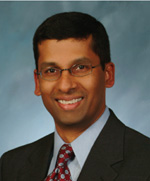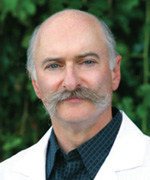
Raghu Adiga, Infectious Disease Associates
She was a seamstress in India working 18-hour days, every day for weeks on end, to make sure that all four of her children would have a college education. “She hadn’t even completed high school herself,” says one of those four, Raghu Adiga, but his mother made good on that commitment.
Today, her son is an infectious disease consultant and epidemiologist at Infectious Disease Associates of Kansas City, splitting his time between Liberty, North Kansas City and Northland Kindred hospitals.
His mother’s example, he says, taught him the value of long hours and hard work—something he’d have to get used to with a career in medicine. And his own path to a medical career was paved with curiosity and a keen appreciation for seeing real-time results of his work.
“I’ve always liked the intellectual exercise and satisfaction offered by my specialty over the hands-on skills needed in certain other specialties, like surgery,” Adiga said. “Besides, the infectious-disease world still offers lots of opportunities for spectacular patient recovery and cure.”
It is not, however, without its challenges. “The biggest challenge in my job is to minimize the amount of time spent on computers and charts, compared to direct interactions with my pat-ients,” he said, but that’s becoming increasingly difficult. “Documentation requirements take time and eat into my time with the family” because the digital age makes it easy for the work to follow him home. But the greatest reward in what he does “is the thank-you from the patient and family who have beaten all the odds and survived from deadly infections,” he says.
Adiga came to the region in 1997, after finishing his residency in internal medicine at Michael Reese Hospital in Chicago. What did he find here? Roots. “I’m a transplant from half the world across!” he marvels. “Now I’m married to a local girl who also practices medicine, have two kids and KC is my home! I don’t think any other city can beat the quality of life, schools and friendliness of people.”

Fred Seligson, Midwest Cardiovascular and Thoracic Surgery
We all know tears of joy and tears of sorrow. Fred Seligson knows tears of gratitude. “The moments that really mean something,” he says, “are when you take someone with a truly life-threatening problem and you fix it, and that person one day has the realization of what’s happened to them and looks at you and they almost start to cry because they realize what you’ve done for them.”
Expressions of gratitude also line the desk of this veteran surgeon, who divides his time between Research and Menorah medical centers. “People make things for me, with their hands,” he marvels. “Simple things, like carvings, or a pen with my name on it. The cards I save on my desk are from some very lovely people who just want to say thank you. I save those, the little things.”
Stop us if you’ve heard this one before—OK, you have—but Seligson is yet another transplant who came to Kansas City thinking short-term but still calls it home. “I was invited here in 1989 for an interview, and came down just to meet people,” says the native of western Pennsylvania. “I never thought I’d end up here, I thought I’d go back to New England.” But wife, Cathy, then in medical school, secured entry to the KU Med Center, and four kids later, “one year became 23,” Seligson said.
He got into cardiothoracic surgery on the guidance of a mentor who told him that if he wanted to be among the best, the human chest was the place to be. Throughout a quarter-century in the trade, Seligson has seen technology drive wondrous changes in his profession—with an occasional techno-turkey thrown in. “The trick is to know for the patient you’re taking care of, which new innovation really has promise,” he said. But “who would ever have dreamed that one day you could replace a heart valve without opening up a patient’s chest?”
Which leads back to grateful patients, who offer up a powerful counterweight to the down side of medicine. “It takes all of the other stuff out of the equation—all the regulations, the requirements, the OSHA notifications, all the government intrusion,” Seligson says. “Just one-on-one, doing something for a regular human being—no paperwork, electronic records or bar codes.”